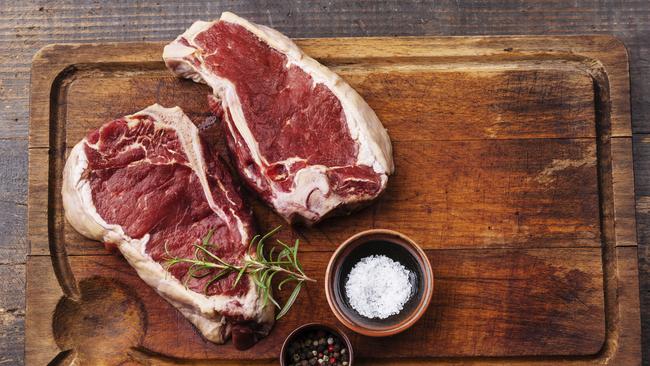Study rejects red meat cancer risk
A study declaring there is little evidence for reducing red meat consumption sparks uproar among scientists and nutritionists.

A major study declaring there is little evidence for reducing red meat consumption has sparked uproar among scientists and nutritionists, who question its findings and accuse its authors of cherry-picking data.
A series of scientific reviews published in the Annals of Internal Medicine, the journal of the American College of Physicians, found little evidence consumption of red meat was linked with cancer, diabetes and heart disease, casting doubt on dietary guidelines that recommend curtailing consumption.
The study runs contrary to Australian nutritional guidelines that recommend limiting consumption of red meat to 455g a week, the equivalent of about three average-sized serves. The Heart Foundation suggests consumption of less than 350g of unprocessed red meat a week.
The author of the latest study, Bradley Johnston, an associate professor at the Department of Community Health and Epidemiology at Dalhousie University in Canada, said the review of scientific literature found only a “low certainty evidence of a very small reduction in cancer, diabetes and heart disease from reducing red meat and processed meat consumption”.
“Based on these reviews, we cannot say with any certainty that eating red meat or processed meat causes cancer, diabetes or heart disease. Any health benefits from staying away from meat are uncertain, and if they exist at all, are very small.”
Australian nutritionist Rosemary Stanton, a a visiting fellow at the School of Medical Sciences at the University of NSW, rejected the findings yesterday. “I am critical of this research for a number of reasons,” Dr Stanton said.
“What they’ve done is ignore a lot of studies. They just picked some reviews (and) didn’t use others. They weren’t comparing meat-eaters with people who didn’t eat meat. They were looking at studies where people had said they reduced meat. It’s just not possible to make a judgment on a single food — you’ve got to look at the whole dietary pattern.”
Online publication WebMD reported yesterday that several public health groups, one of which included an author of one of the study’s papers, wrote to the journal requesting that publication of the study “be postponed for further investigation”.
“It’s the most egregious abuse of data I’ve ever seen,” Walter Willett, a professor of epidemiology and nutrition at the Harvard T.H. Chan School of Public Health, a signatory to the letter, told the publication.
“There are just layers and layers of problems.”
The central concern of US scientists was that the study prioritised evidence from randomised control trials, the gold standard in scientific research, but an extremely difficult type of study in tracking food consumption.
In randomised controlled trials, researchers randomly assign participants to groups receiving different treatment and track what happens to them.
Professor Willett said there were no randomised control trials that tracked people eating red meat and whether they developed cancer or diabetes.
Dr Stanton, who contributed to the development of the Australian dietary guidelines, insisted there was evidence linking heavy meat consumption with cancer.
“The sorts of quantities of red meat that Australian men often eat certainly increase the risk of colorectal cancer.”
The Heart Foundation said yesterday it would not be changing its guidance to consumers to cut down on red meat.
Clare Hughes, chair of the Cancer Council’s Nutrition and Physical Activity Committee, said in 2015 that the International Agency for Research on Cancer considered more than 800 studies on red meat, processed meat and cancer risk: “They concluded that processed meat was carcinogenic and red meat was probably carcinogenic. Eating too much red and processed meats was most commonly associated with bowel cancer,” she said.



